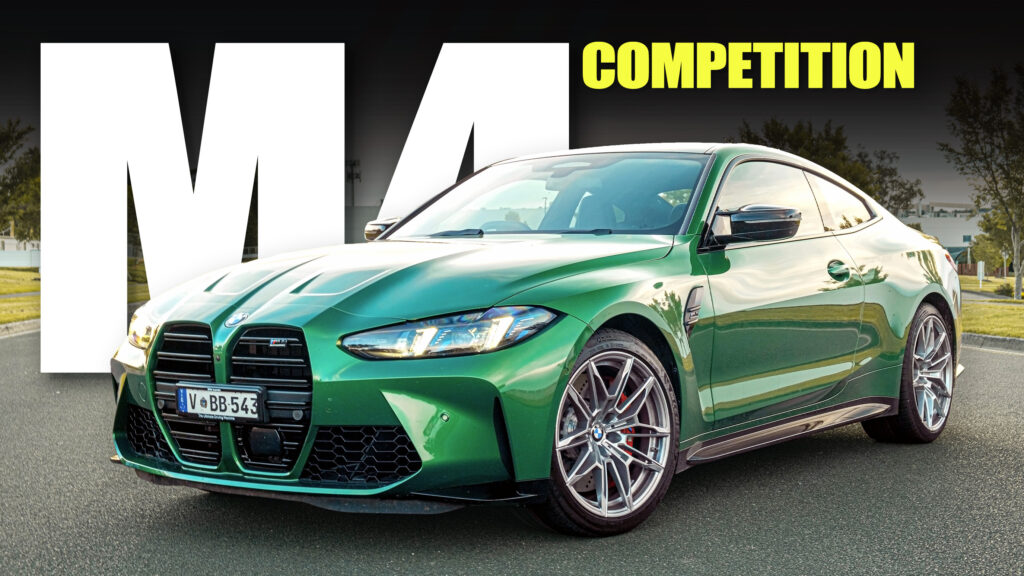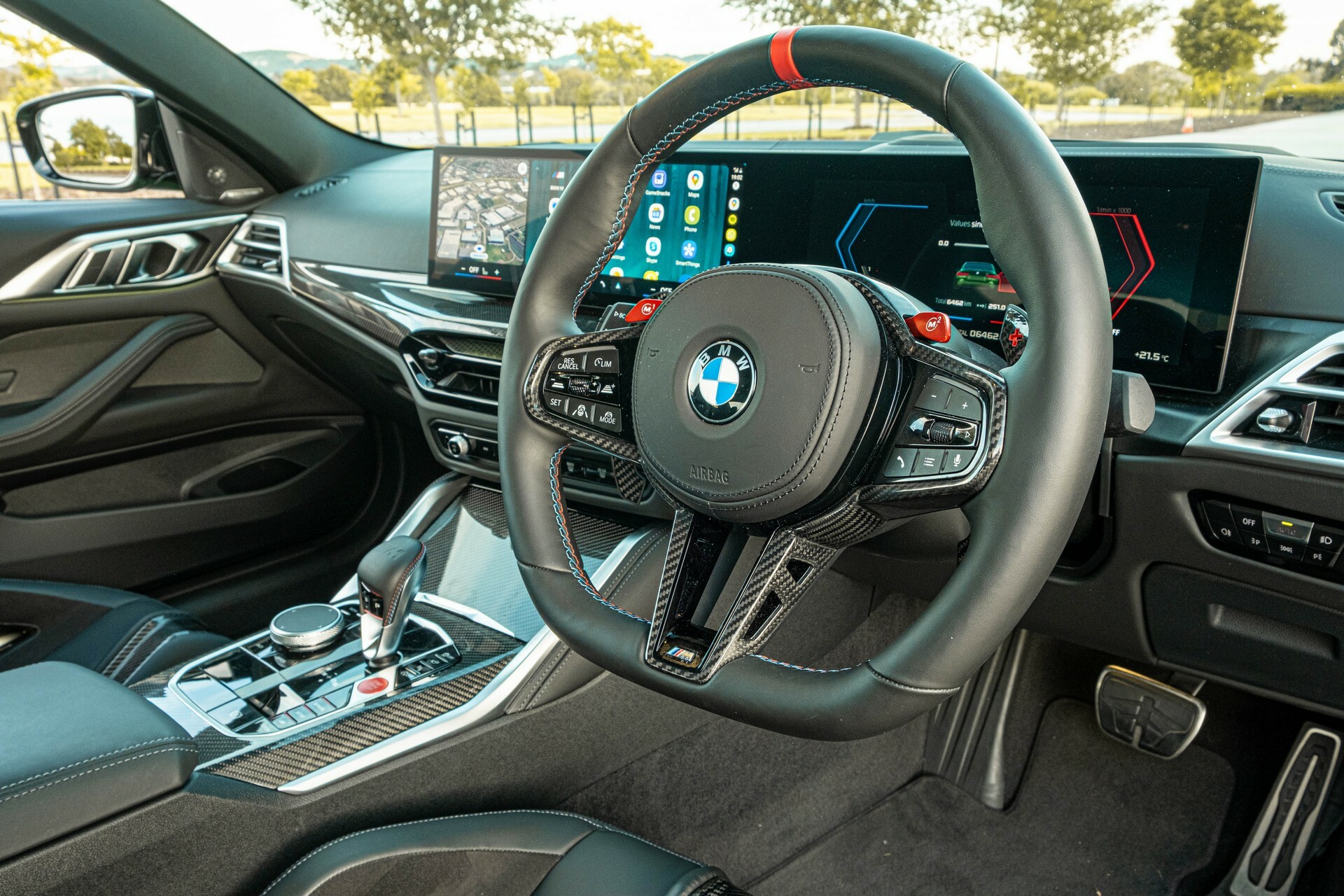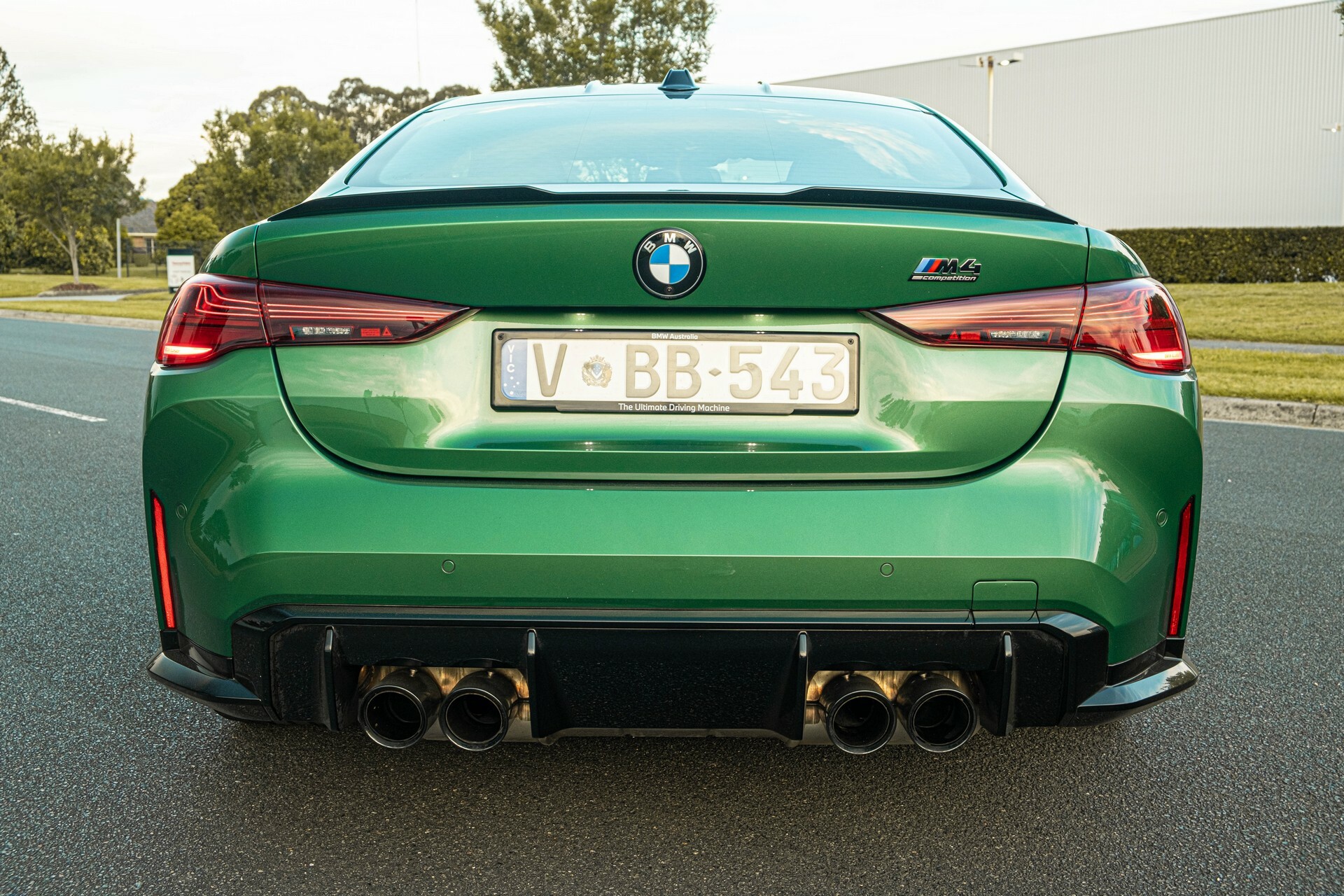Few automotive brands are more iconic than BMW M. Originally founded as the racing division of the German luxury carmaker, it didn’t take long for BMW M to pivot from the track to the street, infusing the company’s road cars with dramatic styling and visceral performance. Over the past few decades, BMW M has created some automotive legends like the E30 M3 and the 1M Coupe. But can the recently-facelifted G82-generation BMW M4 Competition count itself among these icons or is it merely another chapter in a story that’s already been written?
Review: BMW M5 Touring Has 717HP, But Was It Worth The Weight?
BMW first launched the M4 a decade ago as the two-door Coupe and Convertible variants of the M3 sedan, under the F82/F83 codenames. It was an instant success and, in 2020, it was replaced by the G82 series. As the car entered its second era, BMW gave it a significant boost in power, a new engine, and a much more striking design. Earlier this year, the refreshed 2025MY version was rolled out and after recently spending a week living with it, we can confidently say this is one of the finest performance cars on the market.
So, what makes it special and sets it apart from the rest of the pack? Let’s dive in.
QUICK FACTS
Photo Credits: Brad Anderson/Carscoops
The specs
First is the engine. Found under the skin is the Bavarian firm’s lauded 3.0-liter twin-turbocharged S58 straight-six. This engine debuted in the F97 X3 M and F98 X4 M and features a closed-deck aluminum cylinder block, a forged chrome molybdenum crankshaft, forged aluminum pistons, and forged steel connecting rods. It also uses the marque’s famed variable valve timing (Vanos) and variable valve lift.
The standard M4 range consists of the base model and the M4 Competition M xDrive Coupe, which is the one we drove. The six-cylinder delivers 353 kW (473 hp) in standard guise, while the Competition lifts that figure up to 390 kW (523 hp). It also has a thumping 650 Nm (479 lb-ft) of torque between 2,750 rpm and 5,730 rpm. The M4 CS and M4 CSL are even more potent.
Those who want the purest driving experience would be wise to opt for the ‘base’ model, as it’s the only one available with rear-wheel drive and a six-speed manual transmission. By comparison, the Competition has four-wheel drive and an eight-speed automatic. As we discovered, however, the M4 Competition offers more than enough excitement. It’s an absolute animal.
Photo Credits: Brad Anderson/Carscoops
A true head-turner
Approaching our test car for the first time, I was immediately enamored. Finished in a shade known as Isle of Man Green and paired with BMW’s 825 M forged wheels in silver, it looked sensational. A set of bright red brake calipers added to the eye-catching looks.
BMW copped a lot of flak when it first unveiled the current M3 and M4s back in 2021, mostly because of the garish front kidney grilles. Dubbed “double coffin grilles” by critics, their polarizing design ensured they became the talking point of nearly every review. While I’m still not a big fan of them, I’ve always loved the rest of the car’s styling, particularly the sleek and sexy shape, the wide arches, and all of the dramatic lines and curves. It looks much more aggressive than the first-gen M4, and the changes introduced for 2025 add to the appeal.
Speaking of the visual changes for the facelifted G82, they are relatively minor but do make it look even better. The headlights have been altered and now include new LED daytime running lights, while laser LEDs with intricate lighting signatures are found at the rear. They look absolutely fabulous.
It’s not often that I get in a car that makes me feel special every single time I drive it. The 2025 M4 Competition did just that.
Photo Credits: Brad Anderson/Carscoops
An exquisite cabin
First are those seats. Our tester was installed with the optional AU$7,692 ($5,045) carbon fiber buckets. These have also been offered in other M models, like the M5 CS, and might be the finest bucket seats on the planet. They are extremely solid and have holes in the backrest, grab handles on the sides, and a weird carbon fiber bump between your thighs. They’re extreme and yet, are comfortable over long journeys, and when you want to be held tight, they do just that. The side bolsters can also be inflated, cocooning you in fine Merino leather and eliminating any sway in corners. I’m quite slim, and they hugged me tightly. They may be a little too tight for wider occupants, however.
Read: Twin-Turbo BMW M3 To Survive Into Another Generation
You’re then presented with one of the finest views of any current BMW. New for 2025 is a revised flat-bottom steering wheel in plush black leather with M-colored stitching, a red 12 o’clock marker, carbon fiber shift paddles, and many other carbon accents. The wheel is thick but not uncomfortably so. It’s just about right.
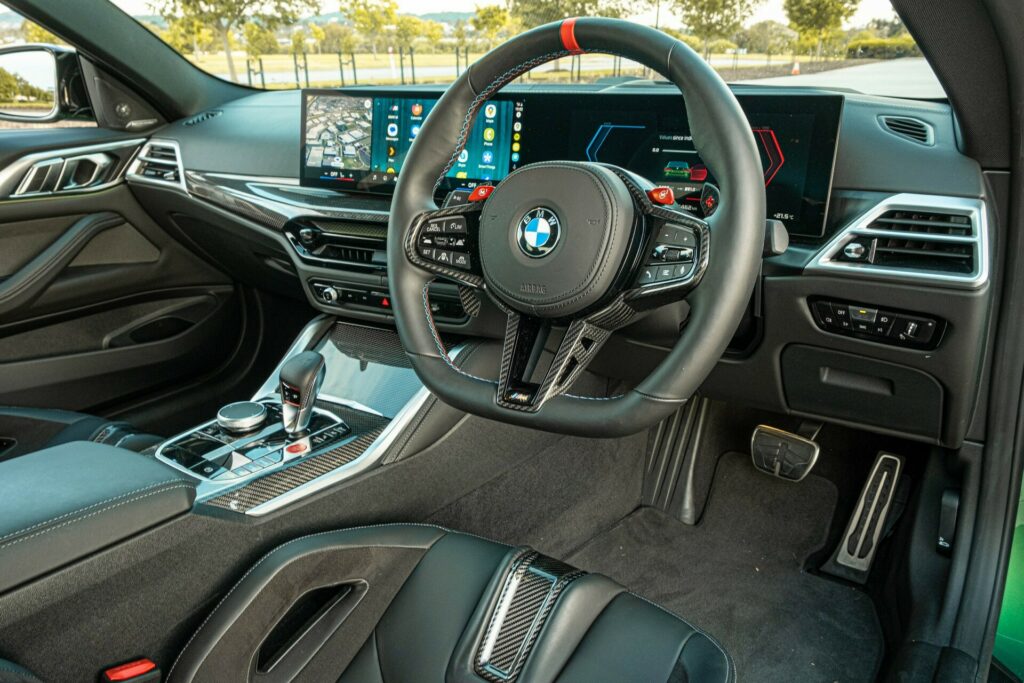
The facelifted model also includes BMW’s premiere curved display with a 12.3-inch digital instrument cluster and a 14.9-inch infotainment screen. This time around, German designers have reduced the number of physical buttons for the HVAC, shifting most of the controls to the screen, but the latest version of iDrive adds some handy shortcuts to ensure climate settings are just a couple of taps away.
The screen includes wireless Apple CarPlay and Android Auto as standard. It also keeps the dizzying array of customizable drive modes and settings on full display, allowing you to toggle between settings while on the move easily.
The rest of the cabin is dripping in carbon fiber, including a section across the dashboard and the transmission tunnel. From the outside, you’d think the rear seats would be absolutely tiny. However, they’re quite comfortable, although taller occupants will need to scrunch their necks down to fit.
BMW has absolutely nailed the driving position with the carbon seats. They can be dropped to the floor and the steering wheel is positioned nice and high.
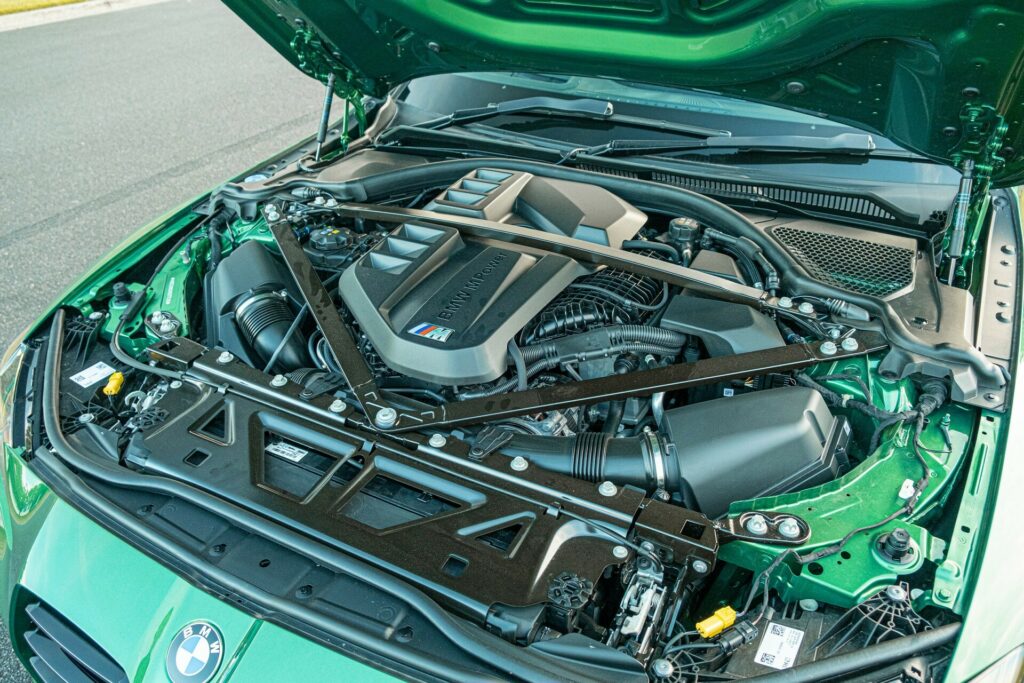
A rocketship with a dual personality
Starting up the 2025 M4 for the first time, the six-cylinder fired into life with an incredible rumble. That’s because the loud exhaust button is switched on as standard. I drove the Alfa Romeo Giulia Quadrifoglio a couple of months ago, and while it, too, has a twin-turbo six-cylinder, it’s not quite as thunderous as the S58.
The dual personality of the engine is particularly impressive. There are three different modes available for the powertrain and when driven in the most economical and with the exhaust turned off, the M4 is a comfortable cruiser that can eat up highway miles in incredible comfort. However, lurking beneath the hood is an engine that comes to life when you turn on either the Sport or Sport Plus settings.
The torque is the first thing that stands out. Regardless of the gear, the 3.0-liter pulls strongly, building up momentum at an alarming rate, and when you need to slow down, the massive brakes are more than up for the task. Tipping the scales at around 1,700 kg (~3,747 lbs), the M4 Competition is heavy, but you’d never know, as M’s engineers have done a brilliant job of masking that weight.
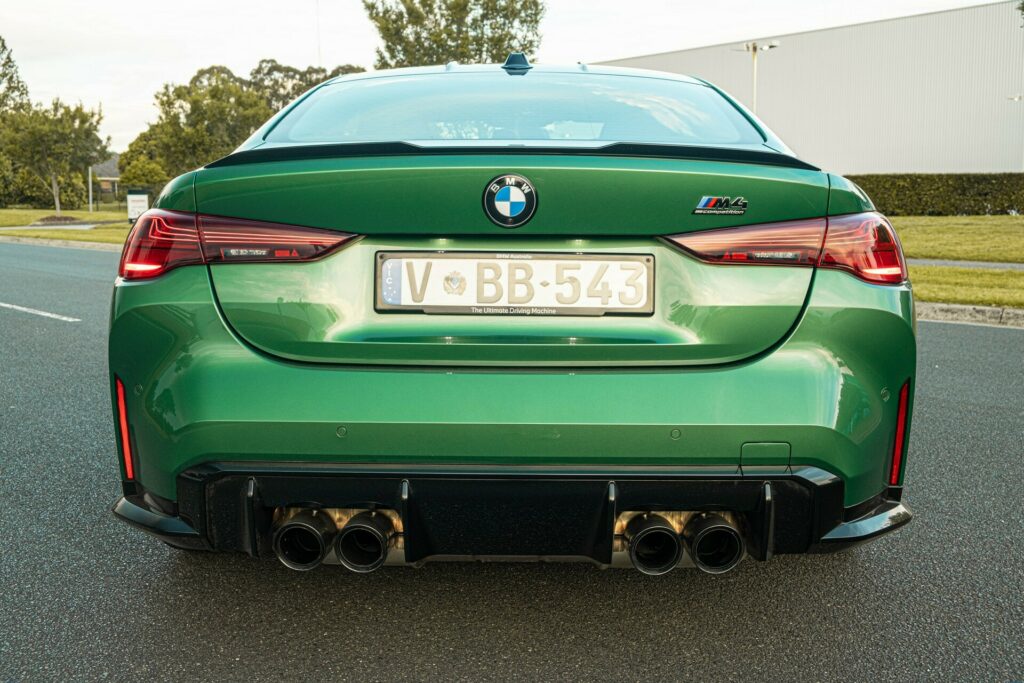
BMW says the M4 Competition can sprint to 100 km/h (62 mph) in just 3.5 seconds. Using a Dragy timer, we recorded a best run of 3.2 seconds and dipped below 3.5 seconds several other times. Make no mistake, this thing is a beast in a straight line. It hooks up with the launch control enabled, providing mountains of grip, and sending the M4 roaring forward like a caged animal. It builds up speed so quickly that it’ll keep pace with supercars from just a decade ago. But that’s only half the story.
Excellent chassis with a clever AWD system
Equipped with sticky Michelin Pilot Sport 4S tires measuring 275/35 ZR19 at the front and 285/30 ZR20 at the rear, the M4 Competition thrives on twisty terrain. The grip on offer is extraordinary, and it’ll go up a mountain road almost as quickly as anything on four wheels. The steering is weighty yet precise and provides plenty of feedback. The chassis has been so brilliantly tuned that it masks the car’s weight, making it feel much lighter than the scales show.
Read: 2025 BMW M4 CS Is A More Sensible CSL, But Does It Hit The Sweet Spot?
At this point, some enthusiasts may complain that you can’t get an M4 with the Competition-spec engine paired with the base model’s rear-wheel-drive setup and six-speed manual. But that’s a non-issue.
One of the best things about the four-wheel drive system of the Competition is how it can be configured. Seeking maximum grip? Leave it in 4WD mode. Want a slightly more rear-biased mode? Turn on 4WD Sport, and the rear end will come into play. Want to replicate what it’s like driving a rear-wheel drive M4? Then simply switch to 2WD where all the power will be transmitted to the rear. What’s more, the rear-wheel drive mode offers 10 levels of traction control adjustment, ensuring drivers can find the perfect setup regardless of the situation.
Photo Credits: Brad Anderson/Carscoops
I also never found myself yearning for a stick shift. Sure, it would have been fun, but cars as fast as these offer more than enough driver engagement without having to think about changing gears. It’s not like the eight-speed auto isn’t great, either. BMW has acknowledged this torque converter is not quite as quick as the seven-speed dual-clutch of the first-gen M4, but it’s still great. This is partly due to the fact that you can choose between three different modes that drastically alter the shift speeds and their aggression. For cruising around town, the eight-speed is best left in its ‘slowest’ setting but when you want to get on it, you can toggle the switch on the shifter and enjoy rapid-fire shifts that give you a kick in the back.
Comfort, Sport, and Sport Plus modes are available for the adjustable suspension. Comfort is the best option for street use, and even still, the M4 is quite stiff, but not uncomfortably so. Indeed, it rides exactly as a sports car should. Comfort and Sport options are also offered for the steering and brakes while diving into the M1 and M2 Configuration modes add some extra options, including no less than six different settings for the transmission.
Photo Credits: Brad Anderson/Carscoops
BMW says the M4 Competition can return between 9.7 l/100 km (24.2 US mpg) and 9.9 l/100 km (23.7 US mpg) over the combined cycle. We averaged 15.6 l/100 km (15 US mpg), which isn’t bad, especially considering it was heavily skewed towards suburban driving with limited highway running. One doesn’t buy a car like this to be fuel efficient anyway.
Verdict
Whether you’re driving to the shops, cruising down the highway, or roaring up your favorite driving road, the M4 Competition makes every moment memorable and that’s what makes it so special. Some may not like the looks or may be confused by some of the infotainment controls, but as a performance package, it excels in all areas.
It feels leagues ahead of the Giulia Quadrifoglio, and after a switch to four-cylinder hybrid power, the Mercedes-AMG C 63 has lost the appeal it once had. The outgoing Audi RS5 is numb and underpowered by comparison, leaving the M4 as the best choice in its segment.



